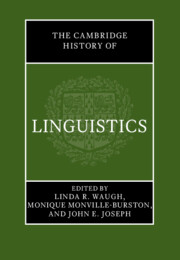Book contents
- The Cambridge History of Linguistics
- The Cambridge History of Linguistics
- Copyright page
- Dedication
- Contents
- Figures
- Tables
- Contributors
- Preface
- Acknowledgments
- Abbreviations, Acronyms, Special Symbols, and Other Conventions
- Introduction
- Part I Ancient, Classical, and Medieval Periods
- Part II Renaissance to Late Nineteenth Century
- Part III Late Nineteenth-through Twentieth-Century Linguistics
- Part IIIA Late Nineteenth Century through the 1950s: Synchrony, Autonomy, and Structuralism
- 13 Move to Synchrony: Late Nineteenth to Early Twentieth Century
- 14 Structuralism in Europe
- 15 British Linguistics
- 16 American Linguistics to 1960: Science, Data, Method
- Part IIIB 1960–2000: Formalism, Cognitivism, Language Use and Function, Interdisciplinarity
- References
- Index
15 - British Linguistics
from Part IIIA - Late Nineteenth Century through the 1950s: Synchrony, Autonomy, and Structuralism
Published online by Cambridge University Press: 20 July 2023
- The Cambridge History of Linguistics
- The Cambridge History of Linguistics
- Copyright page
- Dedication
- Contents
- Figures
- Tables
- Contributors
- Preface
- Acknowledgments
- Abbreviations, Acronyms, Special Symbols, and Other Conventions
- Introduction
- Part I Ancient, Classical, and Medieval Periods
- Part II Renaissance to Late Nineteenth Century
- Part III Late Nineteenth-through Twentieth-Century Linguistics
- Part IIIA Late Nineteenth Century through the 1950s: Synchrony, Autonomy, and Structuralism
- 13 Move to Synchrony: Late Nineteenth to Early Twentieth Century
- 14 Structuralism in Europe
- 15 British Linguistics
- 16 American Linguistics to 1960: Science, Data, Method
- Part IIIB 1960–2000: Formalism, Cognitivism, Language Use and Function, Interdisciplinarity
- References
- Index
Summary
In Part 1, MacMahon describes the work of early British linguistics (e.g., the Oxford English Dictionary), and then discusses the development of phonetics, the role of Daniel Jones, his work on the phoneme, and his belief in ‘practical’ phonetics. After describing Alan Gardiner’s work, he focuses on John Rupert Firth, the dominant figure in the early 1930s to late 1950s, who taught mainly at SOAS in London. He developed ‘a contextual theory of meaning,’ based on Malinowski’s ideas, ‘prosodic phonology’ and the idea of several simultaneous systems (polysystematicity). After Firth’s death, Chomsky’s ideas about syntax became dominant, while the term ‘neo-Firthian’ was applied to Michael Halliday and Systemic Linguistics from the early 1960s.
In Part 2, McEnery and Hardie survey neo-Firthian corpus(-driven) linguistics by John McHardy Sinclair and his group, their focus on ‘collocation’ (co-occurrence patterns of words in discourse), and their interest in ‘lexicogrammar.’ For them a corpus is central: theories and analytic generalizations and categories must emerge from corpus data. They impacted lexicography by setting up COBUILD to provide data, ideas, and analyses. Also important is the ‘Idiom Principle’: i.e., in language there are a large number of semi-preconstructed phrases, which has led to two different neo-Firthian theories of language.
Keywords
- Type
- Chapter
- Information
- The Cambridge History of Linguistics , pp. 496 - 517Publisher: Cambridge University PressPrint publication year: 2023



